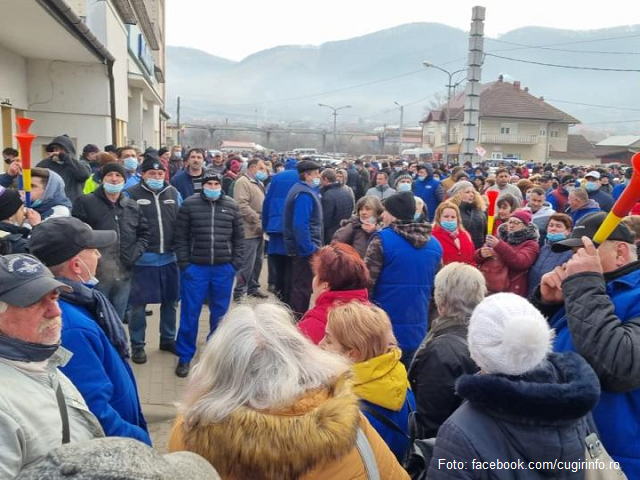Trade union protests
Inadequate salaries prompted the employees of the Mechanical Plant and Arms Plant in Cugir, central Romania, to take to the streets late last week. The protest continued this week as well, when over 700 people marched the streets of the town between the 2 industrial units.

Leyla Cheamil, 16.02.2022, 11:56
Inadequate salaries prompted the employees of the Mechanical Plant and Arms Plant in Cugir, central Romania, to take to the streets late last week. The protest continued this week as well, when over 700 people marched the streets of the town between the 2 industrial units.
They demand better working standards and an increase in salaries, which they say barely cover their heating and electricity bills. They argue they have not had a pay raise in 2 years. “(We are) Overworked and underpaid,” a female employee says, adding that after 40 years of work, in February she was only paid nearly 320 euro.
“We will not give in,” and “Unity” were the protesters main slogans. They say they will not give up until their main demand, a 30% pay raise, is fulfilled.
The Board of Directors of the Cugir Mechanical Plant convened on Monday and offered a 6.5% salary increase. The trade union leader Virgil Matei said people were not happy with the offer.
The Cugir Mechanical Plant produces various types of weapons, 9mm automatic and semi-automatic pistols and accessories. The unit was set up in 1799, when the region was part of the Habsburg Empire, and was called the Steel and Iron Works. In 2004, the company split into the Cugir Mechanical Plant and the Arms Plant.
The latter produces semi-automatic rifles, intended for hunting and shooting sports, for the civilian market, in particular in the US. In the military segment, the units produce AKMs for foreign markets.
Trade unions in the steel industry have also gone on protest. The employees of ALRO Slatina (south) and ALUM Tulcea (south-east), 2 companies running on mostly Russian capital, picketed the government headquarters.
The workers want a one-year cap on natural gas and energy prices, at the level reported for December 2020, as well as financial assistance for the companies that benefitted from state aid in the past.
According to sources in the trade union, the slow-down in operations at ALRO Slatina has already triggered negative effects, leading to over 12,000 employees idled in various other industries.
The leader of the “Aluministulˮ Union, Constantin Popescu, explained that ALRO Slatina has closed down two electrolysis units, with a 3rd one also preparing for shutdown, which is why nearly 500 people were made redundant.
A total of 40,000 jobs in various related industries are jeopardised if ALRO Slatina downsizes operations, the union leader also said, and warned that the last 2 remaining units risk being closed down. According to Constantin Popescu, the government should help ALRO purchase energy at fair prices. (A.M.P.)






























